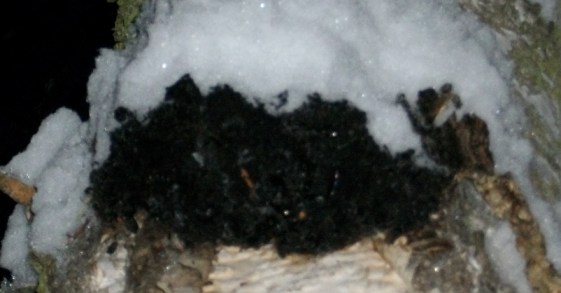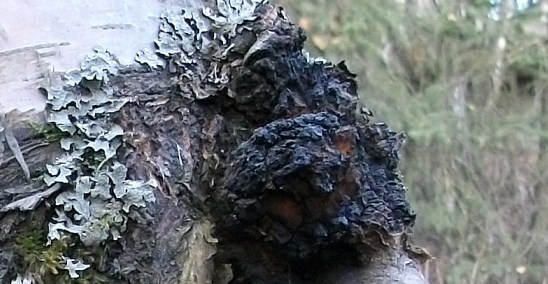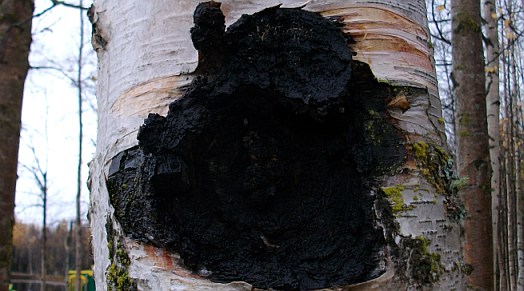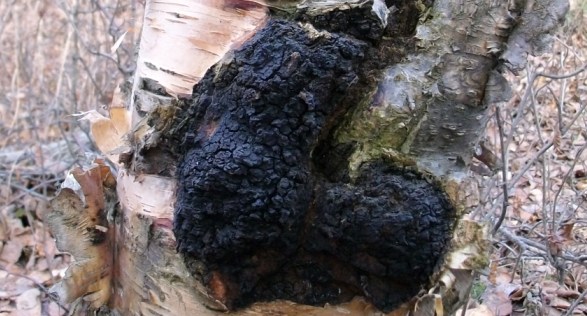Chaga and Cancer: Potential Benefits and Risks
Chaga mushroom (Inonotus obliquus) is a type of fungus that has been used for centuries in traditional medicine to treat various ailments. Recently, studies have shown that Chaga may have potential anticancer properties. The mushroom is rich in polysaccharides, polyphenols, and betulinic acid, which are believed to be responsible for its cancer-fighting effects.
In vitro studies have demonstrated that Chaga extracts and small phenolic compounds derived from the mushroom exhibit cytotoxicity against various cancer cell lines. Furthermore, Chaga has been found to induce autophagy via the AMPK-mTOR signaling pathway in breast cancer cells, suggesting that it may have potential as an adjuvant therapy for cancer treatment. Ergosterol peroxide, a bioactive compound found in Chaga, has also been shown to exhibit anti-cancer activity by down-regulating the β-catenin pathway in colorectal cancer.
While the research on Chaga and cancer is still in its early stages, these findings are promising and suggest that Chaga may have potential as a natural cancer treatment. However, more research is needed to fully understand the mechanisms behind Chaga’s anticancer effects and to determine its safety and efficacy in humans.
What is Chaga Mushroom
Chaga mushroom, also known as Inonotus obliquus, is a type of mushroom that grows on birch trees in cold climates, particularly in Siberia and Northern Europe. It is a parasitic fungus that grows by extracting nutrients from its host tree. Chaga has a unique appearance, resembling a black, burnt-looking mass called a conk.
Chaga has been used for centuries in traditional medicine in Russia, Korea, and other parts of Asia. It is believed to have immune-boosting properties and has been used to treat various ailments, including cancer.
Chaga contains a variety of bioactive compounds, including beta-glucans, triterpenes, and ergosterol peroxide. These compounds have been found to have anti-tumor, anti-inflammatory, and antioxidant properties.
Chaga mushroom is typically consumed as a tea or in supplement form. It is important to note that while chaga has been shown to have potential health benefits, more research is needed to fully understand its effects on the body and its potential use in cancer treatment.
Chaga and Health
Chaga mushroom (Inonotus obliquus) has been used for centuries in traditional medicine to promote health and wellbeing. Recent scientific studies have investigated the potential health benefits of Chaga and its active compounds, including its potential anti-cancer properties.
Chaga is known to contain a variety of bioactive compounds, including polysaccharides, triterpenoids, and phenolic compounds. These compounds have been shown to have antioxidant and anti-inflammatory effects, which may contribute to Chaga’s potential health benefits.
Antioxidants are compounds that help protect the body against the damaging effects of free radicals, which are unstable molecules that can damage cells and contribute to aging and disease. Chaga’s antioxidant compounds may help protect against oxidative stress and reduce the risk of chronic diseases such as cancer, heart disease, and diabetes.
In addition to its antioxidant properties, Chaga may also support immune function. Studies have shown that Chaga’s polysaccharides may help stimulate the immune system, which may help the body fight off infections and diseases.
Furthermore, Chaga has been shown to have anti-inflammatory effects, which may help reduce inflammation in the body. Chronic inflammation has been linked to a variety of health problems, including heart disease, diabetes, and cancer.
Overall, while more research is needed to fully understand the potential health benefits of Chaga, the available evidence suggests that it may have antioxidant, immune-boosting, and anti-inflammatory properties that could promote health and wellbeing.
Chaga as a Supplement
Chaga has gained popularity as a supplement due to its potential health benefits, including its anti-cancer properties. It is available in various forms, including capsules, tea, powders, and extracts.
Chaga capsules are a convenient way to consume this supplement for those who do not prefer the taste of Chaga tea. They are made by grinding dried Chaga mushrooms into a fine powder and then encapsulating it. Chaga capsules are available in different strengths and can be taken daily as recommended by the manufacturer.
Chaga tea is a popular way to consume Chaga, and it is made by boiling dried Chaga mushrooms in water. The tea can be consumed hot or cold and is available in tea bags or loose form. Chaga tea is rich in antioxidants and may help to boost the immune system.
Chaga powder is another form of Chaga supplement that can be added to smoothies, juices, or other drinks. It is made by grinding dried Chaga mushrooms into a fine powder. The powder form is a convenient way to consume Chaga for those who do not prefer the taste of Chaga tea.
Chaga is also available in the form of extracts, which are made by extracting the active compounds from Chaga mushrooms using solvents such as alcohol or water. Chaga extracts are available in liquid or powder form and are highly concentrated. They are often used in higher doses than other forms of Chaga supplements.
Chaga is a rich source of vitamins and minerals, including vitamin D, potassium, and zinc. It also contains polysaccharides and beta-glucans, which are believed to have immune-boosting properties. Chaga is one of several medicinal mushrooms that are used as supplements due to their potential health benefits.
Overall, Chaga is a natural supplement that may offer several health benefits, including its anti-cancer properties. However, it is important to note that more research is needed to fully understand the effects of Chaga on cancer and other health conditions. As with any supplement, it is recommended to speak with a healthcare provider before adding Chaga to your diet.
Chaga and Cancer
Chaga mushroom (Inonotus obliquus) has been traditionally used for centuries in Russia and other parts of Eastern Europe and Asia as a folk medicine to treat various ailments, including cancer. Recent studies have shown that Chaga mushroom possesses anticancer effects and antitumor activity.
In vitro studies have demonstrated that Chaga mushroom extracts and small phenolic compounds isolated from Chaga have cancer cell toxicity and can induce apoptosis (programmed cell death) in various types of cancer cells, including human colon cancer cells, melanoma cells, and lung cancer cells. One study found that ergosterol peroxide, a compound found in Chaga mushroom, exhibits anti-cancer activity by down-regulating the β-catenin pathway in colorectal cancer.
In vivo studies have also shown that Chaga mushroom has the potential to inhibit tumor growth and metastasis. Subfractions containing pure compounds of Chaga mushroom extract were found to inhibit tumor growth in mice bearing Sarcoma-180 cells. Another study found that treatment with Chaga mushroom extract reduced tumor size and tumor weight in mice with liver cancer.
While more research is needed to fully understand the mechanisms behind Chaga mushroom’s anticancer effects, it is believed that its high concentration of antioxidants, polysaccharides, and betulinic acid contribute to its potential cancer prevention and treatment properties.
Overall, Chaga mushroom shows promising anticancer and antitumor activity in both in vitro and in vivo studies. However, it is important to note that Chaga mushroom should not be used as a substitute for conventional cancer treatments and should be taken under the guidance of a healthcare professional.
Bioactive Compounds in Chaga
Chaga mushroom (Inonotus obliquus) has been studied for its potential anti-cancer properties due to the presence of various bioactive compounds. These compounds include polysaccharides, terpenoids, triterpenoids, inotodiol, ergosterol, and ergosterol peroxide.
Polysaccharides are long chains of carbohydrates that have been shown to have immunomodulatory effects. They can stimulate the immune system and help the body fight against cancer cells. Terpenoids and triterpenoids are organic compounds that have been found to have anti-inflammatory and anti-tumor properties. These compounds can inhibit the growth of cancer cells and induce apoptosis (programmed cell death) in cancer cells.
Inotodiol is a triterpenoid found in chaga mushroom that has been shown to have anti-inflammatory and anti-tumor properties. It can inhibit the growth of cancer cells and induce apoptosis in cancer cells. Ergosterol is a steroid found in chaga mushroom that has been shown to have anti-cancer properties. It can inhibit the growth of cancer cells and induce apoptosis in cancer cells.
Ergosterol peroxide is a derivative of ergosterol that has been found to have anti-cancer properties. It can down-regulate the β-catenin pathway in colorectal cancer cells, which can inhibit the growth of cancer cells and induce apoptosis in cancer cells.
Overall, chaga mushroom contains a complex mixture of bioactive compounds that have been shown to have anti-cancer properties. While more research is needed to fully understand the mechanisms of action of these compounds, the potential therapeutic benefits of chaga mushroom in cancer treatment are promising.
Chaga in Traditional Medicine
Chaga mushroom (Inonotus obliquus) has been used in traditional medicine for centuries, particularly in Russia, Korea, Canada, and Japan. In these countries, Chaga has been used as a folk medicine to treat a variety of ailments, including cancer.
In Russia, Chaga has been used as a traditional medicine for centuries. It was often used to treat gastrointestinal issues, such as stomach pain and ulcers, as well as to boost the immune system. In Korea, Chaga has been used to treat a variety of ailments, including cancer, diabetes, and hypertension.
In Canada, Chaga has been used by indigenous populations as a traditional medicine for centuries. It was often used to treat a variety of ailments, including cancer, digestive disorders, and skin conditions. In Japan, Chaga has been used as a traditional medicine to boost the immune system and to treat cancer.
Chaga has been used in traditional medicine to treat cancer due to its purported anti-cancer properties. While there is limited scientific evidence to support this claim, some studies have shown that Chaga may have anti-cancer properties. For example, a study conducted in 2010 found that subfractions containing pure compounds of Chaga mushroom extract inhibited tumor growth in mice bearing Sarcoma-180 cells. Another study conducted in 2021 found that Chaga mushroom extract induced autophagy via the AMPK-mTOR signaling pathway in breast cancer cells.
Overall, while there is limited scientific evidence to support the use of Chaga as a traditional medicine to treat cancer, it has been used for centuries in various cultures for this purpose. Further research is needed to better understand the potential anti-cancer properties of Chaga and its efficacy as a treatment for cancer.
Chaga and Blood Sugar
Chaga mushroom has been found to have potential benefits for regulating blood sugar levels. Several studies have shown that Chaga extracts can lower blood glucose levels, making it a promising natural treatment for diabetes.
In one study, it was found that Chaga extracts can function as an antidiabetic agent by lowering blood glucose levels. The study also showed that Chaga extracts can inhibit the activity of alpha-amylase and alpha-glucosidase enzymes, which are responsible for breaking down carbohydrates into glucose in the digestive system.
Chaga extracts have also been found to have an insulin-sensitizing effect, which can help improve insulin resistance in individuals with diabetes. Insulin resistance is a condition where the body becomes resistant to the effects of insulin, leading to high blood sugar levels.
Furthermore, Chaga extracts have been shown to have a protective effect on pancreatic beta-cells, which are responsible for producing insulin. This protective effect can help prevent the destruction of beta-cells, which can lead to a decrease in insulin production and the development of diabetes.
Overall, the potential benefits of Chaga mushroom for regulating blood sugar levels make it a promising natural treatment for diabetes. However, more research is needed to fully understand the mechanisms behind its antidiabetic effects and to determine optimal dosages for therapeutic use.
Chaga and Cholesterol
Cholesterol is a waxy substance that is found in every cell of the body. While the body needs cholesterol to build healthy cells, too much cholesterol can lead to a buildup of plaque in the arteries, which can increase the risk of heart disease and stroke. Chaga mushroom has been shown to have potential benefits for cholesterol levels.
In a study published in the Journal of Lipid Research, researchers found that triterpenes and steroids found in chaga mushroom may regulate cholesterol biosynthesis. These compounds were found to inhibit the activity of an enzyme involved in cholesterol synthesis, which may help to lower cholesterol levels in the body.
Another study conducted on rats with high cholesterol levels found that fermented chaga mushroom extract significantly lowered their total cholesterol, triglycerides, and LDL cholesterol levels. Additionally, it increased their HDL cholesterol levels, which is considered the “good” cholesterol.
Furthermore, polysaccharides extracted from chaga mushroom have been found to have antilipidperoxidative effects. This means that they may help to prevent the oxidation of lipids, which can contribute to the development of atherosclerosis.
Overall, while more research is needed to fully understand the effects of chaga mushroom on cholesterol levels in humans, the available studies suggest that it may have potential benefits for those with high cholesterol. However, individuals should always consult with their healthcare provider before incorporating any new supplements or dietary changes into their routine.
Chaga and the Immune System
Chaga mushroom (Inonotus obliquus) has been used for centuries as a traditional medicine in Russia, Korea, and other parts of Asia. It is known for its various health benefits, including its potential to boost the immune system.
Chaga contains beta-glucans, which are complex sugars that stimulate the immune system by activating white blood cells such as macrophages, natural killer cells, and T-cells. These cells are responsible for fighting off infections and diseases in the body.
In addition to beta-glucans, chaga also contains polysaccharides that have immunomodulatory effects. These substances can balance the immune system by either increasing or decreasing its activity as needed. This can be particularly beneficial for people with autoimmune disorders, where the immune system mistakenly attacks healthy cells in the body.
Studies have shown that chaga can increase the production of cytokines, which are proteins that regulate the immune response. Specifically, chaga has been found to increase the production of interleukin-6 and interleukin-12, which are important cytokines for immune function.
Furthermore, chaga has been found to have anti-tumor properties, which may be due in part to its effects on the immune system. Chaga has been shown to stimulate the immune system to attack cancer cells and reduce tumor growth in animal studies.
Overall, chaga has potential immunomodulatory and immunostimulatory effects, which can help support a healthy immune system. However, more research is needed to fully understand the mechanisms behind chaga’s effects on the immune system and its potential as a complementary therapy for various diseases.
Potential Side Effects of Chaga
While Chaga mushrooms are generally considered safe to consume, some individuals may experience side effects. It is important to note that the side effects of Chaga are not well studied, and more research is needed to fully understand the potential risks.
Toxicity
Chaga mushrooms are not considered toxic, but it is important to be cautious when consuming them. Some sources suggest that Chaga may contain high levels of oxalates, which can cause kidney stones in susceptible individuals. Additionally, Chaga may contain heavy metals, which can be toxic in large amounts.
Risks
There are several potential risks associated with consuming Chaga mushrooms. Some people may be allergic to Chaga, and may experience symptoms such as itching, hives, or difficulty breathing. Additionally, Chaga may interact with certain medications, such as blood thinners or immunosuppressants.
Side Effects
While there is limited research on the side effects of Chaga, some individuals have reported mild side effects after consuming it. These side effects may include:
- Upset stomach
- Diarrhea
- Nausea
- Vomiting
- Headache
It is important to note that these side effects are not well studied, and more research is needed to fully understand the potential risks associated with consuming Chaga mushrooms.
Overall, while Chaga mushrooms are generally considered safe to consume, it is important to be cautious and speak with a healthcare provider before adding Chaga to your diet. If you experience any adverse effects after consuming Chaga, it is important to stop using it and seek medical attention if necessary.
Chaga and Other Conditions
While chaga is often associated with cancer treatment, it has also been studied for its potential to treat other conditions. Here are some of the conditions that have been studied:
Infections
Chaga has been found to have antibacterial and antiviral properties, which makes it a potential treatment for infections. Studies have shown that chaga extract can inhibit the growth of certain bacteria and viruses, including E. coli, Staphylococcus aureus, and Herpes simplex virus.
Blood Pressure
Some studies have suggested that chaga may help lower blood pressure. One study found that chaga extract reduced blood pressure in rats with high blood pressure. However, more research is needed to determine if chaga can have the same effect in humans.
Rheumatoid Arthritis
Chaga has been studied for its potential to reduce inflammation, which makes it a possible treatment for rheumatoid arthritis. One study found that chaga extract reduced inflammation in rats with arthritis. However, more research is needed to determine if chaga can have the same effect in humans.
Depression
One study found that chaga extract had antidepressant effects in mice. However, more research is needed to determine if chaga can have the same effect in humans.
Overall, while chaga has shown potential for treating a variety of conditions, more research is needed to determine its effectiveness and safety for human use. It is important to consult with a healthcare provider before using chaga or any other supplement for medical purposes.
Chaga and Cancer Research
Chaga mushroom (Inonotus obliquus) has been the subject of numerous studies investigating its potential anti-cancer properties. Animal studies have shown that continuous intake of Chaga extract can suppress cancer progression and maintain body temperature in mice. In addition, subfractions containing pure compounds of Chaga extract have been found to exhibit anti-cancer activity in human cancer cells and in mice with solid tumors.
One of the mechanisms by which Chaga may exert its anti-cancer effects is through the induction of apoptosis, or programmed cell death. Several studies have reported that Chaga extract can increase the expression of pro-apoptotic proteins such as Bax and p27, while decreasing the expression of anti-apoptotic proteins such as Bcl-2. This shift in the balance of pro- and anti-apoptotic proteins can lead to the death of cancer cells.
Chaga extract has also been found to affect the cell cycle of cancer cells. In vitro studies have shown that Chaga extract can induce cell cycle arrest at the G0/G1 phase, which can inhibit cancer cell proliferation. This effect may be mediated by the downregulation of cyclin E, a protein that plays a key role in the G1/S transition of the cell cycle.
While the results of animal and in vitro studies are promising, clinical trials investigating the efficacy of Chaga extract in cancer treatment are still lacking. It is important to note that Chaga extract should not be used as a substitute for conventional cancer treatments such as chemotherapy or surgery. However, Chaga extract may have potential as an adjunct therapy to conventional treatments, and further research is needed to fully understand its anti-cancer properties.
In conclusion, Chaga mushroom extract has shown potential as an anti-cancer agent through its effects on apoptosis and cell cycle regulation. While more research is needed to fully understand its efficacy in human cancer treatment, the results of animal and in vitro studies are promising.
Regulation of Chaga
There is a growing interest in the potential benefits of Chaga mushroom (Inonotus obliquus) as a natural supplement for cancer treatment. However, it is important to note that the FDA has not approved Chaga as a treatment for cancer or any other medical condition.
Chaga is classified as a dietary supplement, which means that it is not subject to the same regulations as prescription drugs. As a result, the quality and purity of Chaga products can vary widely, and it is important to purchase supplements from reputable sources.
Despite the lack of FDA approval, some studies have shown that Chaga may have anti-cancer properties. One study found that ergosterol peroxide, a compound found in Chaga, exhibited anti-cancer activity by down-regulating the β-catenin pathway in colorectal cancer cells [1]. Another study found that subfractions containing pure compounds of Chaga extract inhibited tumor growth in Balbc/c mice [2].
It is important to note that while these studies are promising, more research is needed to determine the safety and efficacy of Chaga as a cancer treatment. It is also important to consult with a healthcare professional before taking any supplements, including Chaga.
In summary, while Chaga may have potential as a natural supplement for cancer treatment, it is important to exercise caution and purchase supplements from reputable sources. More research is needed to determine the safety and efficacy of Chaga, and individuals should consult with a healthcare professional before taking any supplements.
[1] Source: https://www.sciencedirect.com/science/article/pii/S0378874115300477
[2] Source: https://synapse.koreamed.org/search.php?here=aview&id=10.4162/nrp.2010.4.3.177&code=0161nrp&vmode=full
[3] Source: https://www.fda.gov/food/dietary-supplement-products-ingredients/dietary-supplement-labeling-guide#What_is_a_dietary_supplement
Conclusion
Chaga mushroom has been studied for its potential anti-cancer activity against several types of cancer, including bladder cancer, hepatoma, and colon cancer. The studies have shown that Chaga mushroom can inhibit cancer cell proliferation, induce cell cycle arrest, and promote apoptosis in cancer cells.
Chaga has been found to be effective against cancer cells due to its high content of bioactive compounds such as polysaccharides, triterpenoids, and polyphenols. These compounds have been shown to have anti-tumor effects by modulating various signaling pathways in cancer cells.
In addition to its anti-cancer activity, Chaga mushroom has also been found to have immunomodulatory and anti-inflammatory effects, which may contribute to its potential as a cancer treatment. However, further research is needed to fully understand the mechanisms of action of Chaga mushroom and its potential as a cancer treatment.
Overall, the studies suggest that Chaga mushroom has promising anti-cancer activity, but more research is needed to determine its safety and efficacy in humans. Chaga mushroom should not be used as a sole treatment for cancer, but rather as a complementary therapy alongside conventional treatments. It is important to consult with a healthcare professional before using Chaga mushroom or any other natural supplements for cancer treatment.



